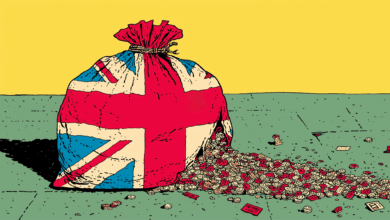Britain’s Prime Minister Backflips

It’s been a year since Sir Keir Starmer became our Prime Minister, and he is already earning a reputation as someone consistently inconsistent.
“Mr. U-Turn,” as he’s being called, famously gave a speech in May over reforms to Britain’s immigration policies. Dubbed the “Island of Strangers” speech, it was well-received by the public, despite criticism for its similarities to Enoch Powell’s famous “Rivers of Blood” speech. But as it turns out, the speech was not one that Starmer bothered to read, admitting he should have “read through it properly” as he expressed regret for his remarks.
But this is not the only U-Turn Starmer has made in recent days. The more consequential reversion, and one prompting a major rebellion from backbenchers—the MPs in his party who are not part of the cabinet—is over welfare reforms, which are both controversial and necessary.
Welfare and health spending takes up a significant proportion of the UK budget, and disability benefits have rocketed up in recent years. Since the pandemic, annual expenditure on working-age health and disability benefits has risen by £20 billion ($27 billion) and is expected to increase by another £18 billion ($25 billion) by the end of the parliament (2029). This would bring the total expenditure up to an eye-watering £70 billion a year ($95 billion).
This is because over 1 million people have signed on, claiming health-related benefits, since 2020, with the full figure of claimants rising to just under four million. What’s more, the main system of support that has come to be emblematic of this whole issue—Personal Independence Payments (PIP)—is expected to double in recipients, from 2 to 4 million, by 2030. The vast majority of the people claiming health-related benefits are supported by PIP, and this is expected to rise further.
PIP is designed, ostensibly, to support people whose disabilities prevent their day-to-day activities—including, obviously, work. On the surface, this makes sense; people in wheelchairs inevitably face difficulties, despite increased attempts to make public spaces wheelchair-accessible. More low-level disabilities like asthma are considered to be obstructive, but not debilitating, meaning some support can be claimed. However, the ambiguity around what constitutes debilitating illness has led to abuse: there has been a serious rise in claims on the basis of “ill mental health.”
As the Institute for Fiscal Studies has detailed, the proportion of claims made on the basis of mental health rose from 32% in 2019 to 41% in 2024, while more than two-thirds (69%) of claimants under the age of 25 are claiming for this reason. What’s more, you do not need a doctor’s note to claim PIP; you simply need to prove (via a form) that your personal disability affects your daily life. As a result, many claims are made on the basis of self-referral. During Covid, when many claims were assessed over the phone because doctors were not available for visits, a lot of claims were just waved through, especially those related to anxiety or other similar conditions.
Which is why it was welcome when, on the 18th of March, the government published a Green Paper (a document outlining policy proposals welcoming external contributions) focused on reforming Britain’s welfare system, and encouraging people to go back to work. The main proposal was a substantial change to the PIP process, which would affect roughly half of the people currently claiming it. The Universal Credit and Personal Independence Payment Bill proposed that a new means-testing method would be introduced, setting up criteria that would need claimants to score four points in at least one daily activity.
The government hoped that the new system would save £5 billion per annum ($6.8 billion), which is barely a dent in a bill nearly 14 times that amount, but reforms were considered necessary in order to prevent further tax rises and the situation spiraling out of control. The government’s own projection shared in the Spring Statement estimated that, without reform, the welfare bill would cost a further £30 billion ($40 billion) overall by 2029. Starmer himself argued that the system “traps” people in benefits, which was part of the reason the reforms were intended not just to undo the ratchet of costs, but also to facilitate the economically inactive back into work.
Yet the Labour Party, committed to big state spending, wouldn’t have it. On the 24th of June, 120 Labour MPs fought back to block cuts to welfare, including PIP reform—and that many rebels is enough to compromise the government’s majority. This meant the government would likely lose the vote on the Bill. Losing a vote on a bill is not uncommon, but it has become increasingly perilous to do so, especially since convention dictates that the Prime Minister holds his position as long as the majority of the largest party supports him. Major rebellions can lead to serious divisions, and eventually topple governments.
Consequently, on the 1st of July, it was announced that the PIP reforms would be shelved. Even so, at the Bill’s second reading, 49 Labour MPs voted against it, the largest rebellion of Starmer’s premiership so far. The size of the government’s majority means this can be absorbed, but it still could create difficulties if resentment sinks in. The real upset, however, is the long-term financial implications of this inability to pursue serious welfare reform, indicating a lack of party unity (and, ultimately, seriousness) to pursue the stated goal of the government’s economic agenda and “going for growth.”
If our economically inactive population was added to the official unemployment statistics, the headline stat would be significantly bigger, at 11 million. Given our working age population is just shy of 44 million, our unemployment figure is realistically closer to a quarter. If this government was serious about improving our economic prosperity, it would incentivize people to get back to work—and that would mean reforming the benefits system. From the ground up, if need be.
The post Britain’s Prime Minister Backflips was first published by the Foundation for Economic Education, and is republished here with permission. Please support their efforts.



